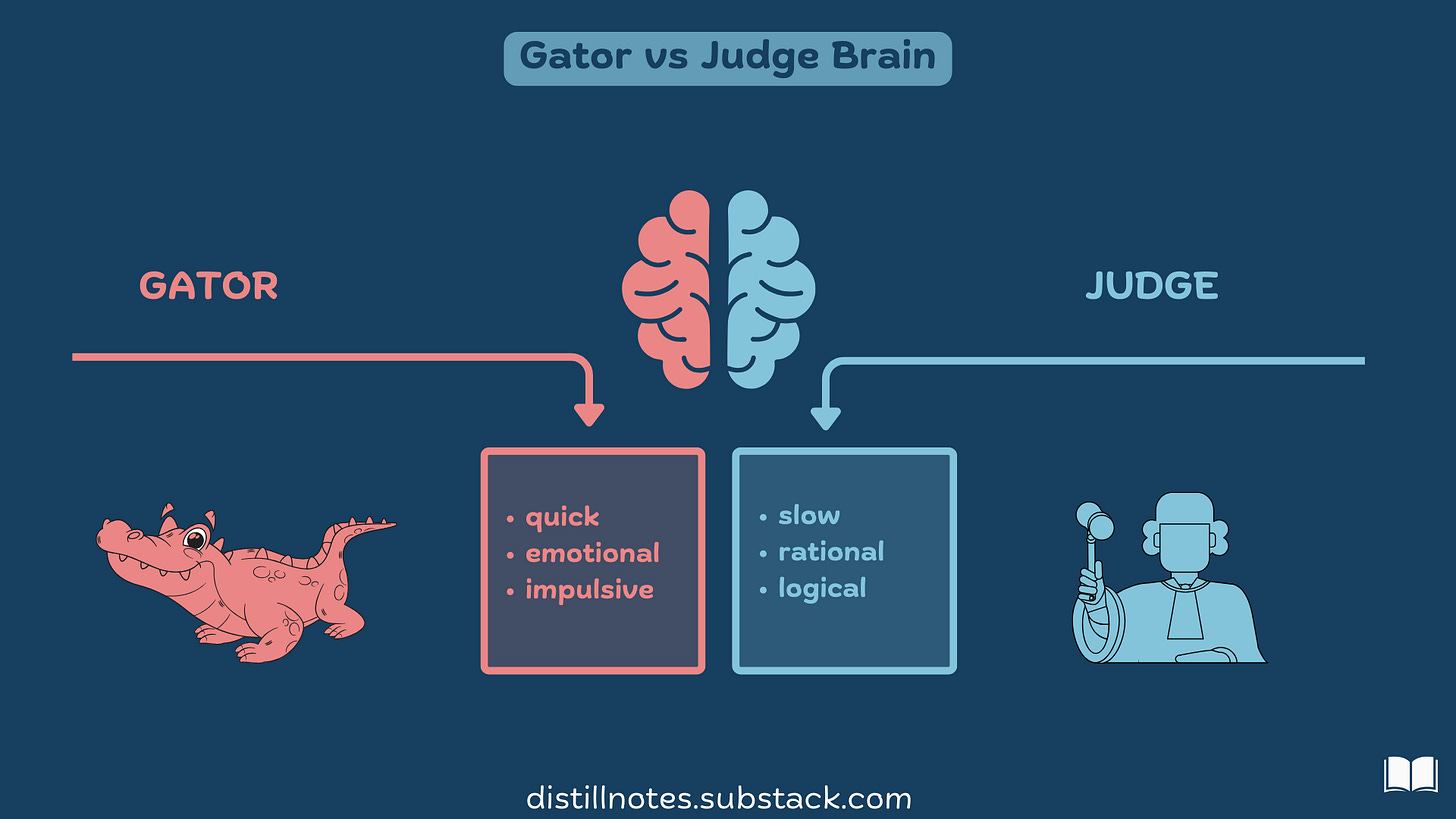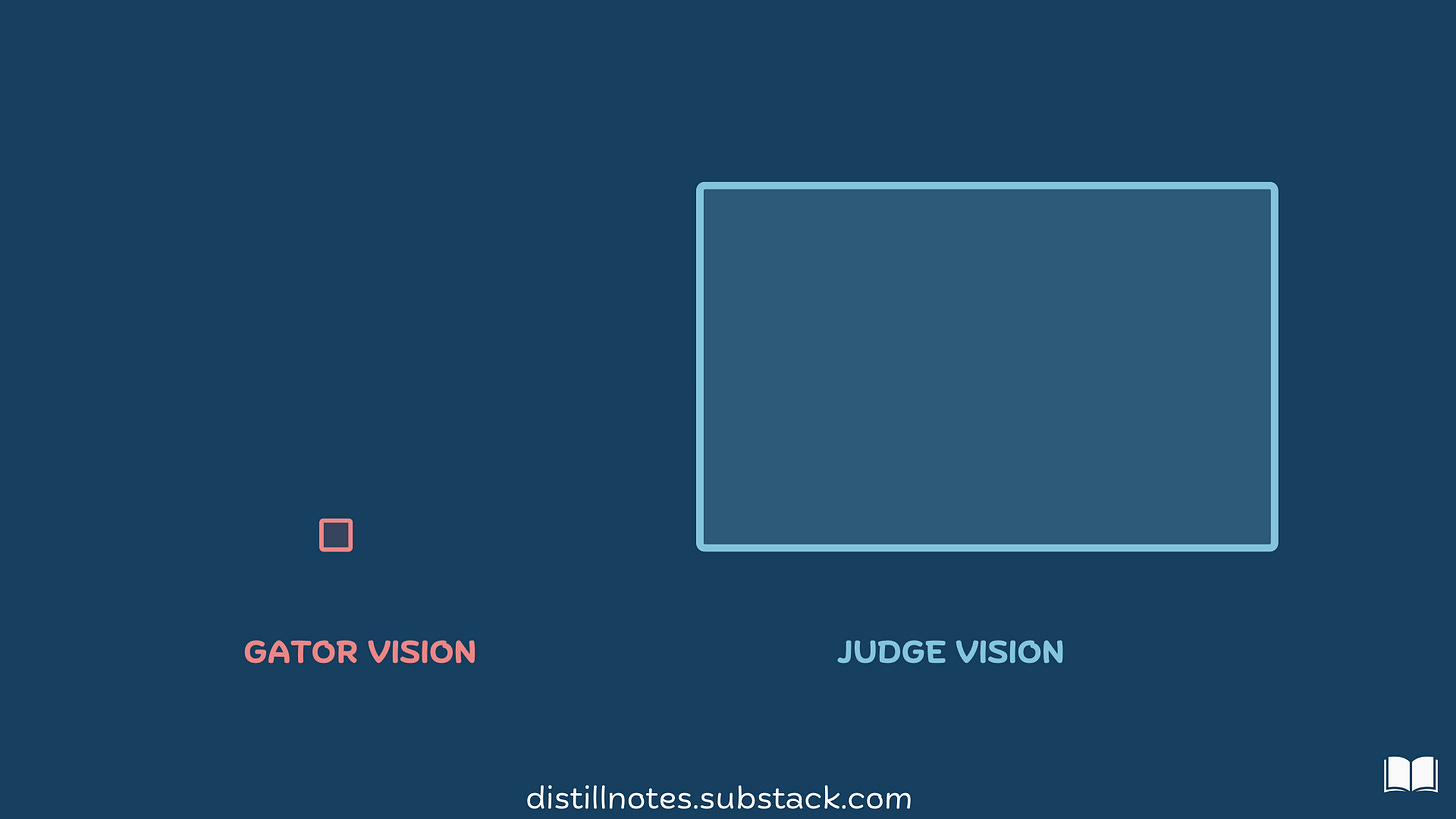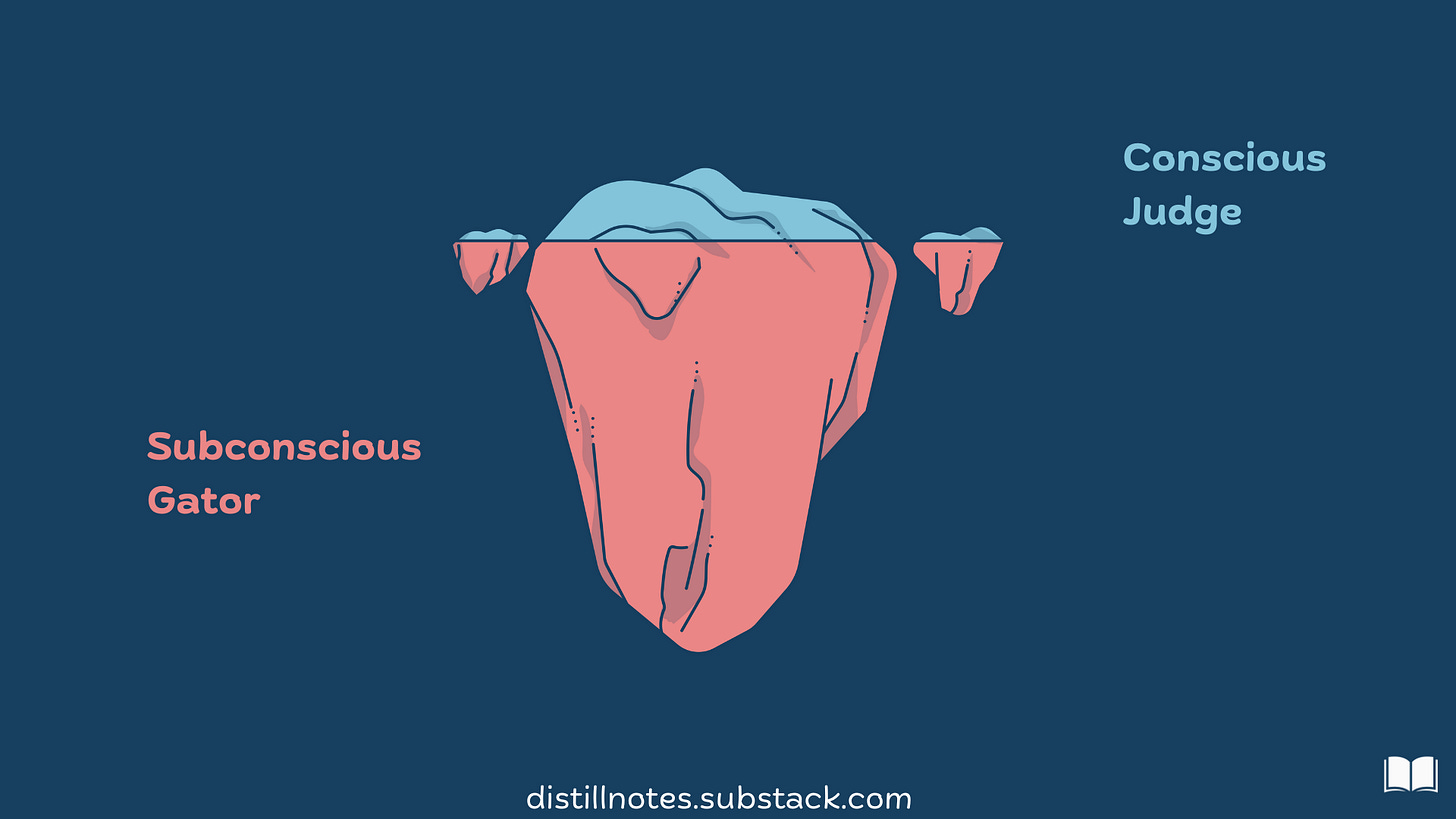Why do you grab that ice cream while on a diet?
Why do you put off important tasks?
Why do you freeze before a sales call?
I’ve wondered the same thing. While reading Influence is Your Superpower by Zoe Chance, I came across a fascinating explanation.
It turns out there are two systems in your mind, often in conflict, that drive your decisions: the fast, instinctive Gator and the slow, rational Judge.
In this edition, we’ll explore:
The two brains: the Gator and the Judge.
How these two systems interact—and sometimes clash.
Practical ways to manage the Gator and make better decisions.
Let’s dive in.
Meet The Two Brains
System #1: The Gator
The term "Gator" comes from the alligator brain—instinctive and focused on survival. The Gator is fast and works without much effort. It reacts quickly to threats or opportunities, using habits and emotions to decide what to do. It avoids hard work and takes the easiest path.
For example, imagine you’re walking past a bakery, and the smell of cookies makes you want to buy some instantly. That’s the Gator at work—it’s focused on the immediate pleasure of the cookies and ignores long-term health goals.
The Gator works on autopilot, below your conscious mind, making decisions instantly without thinking too much.
System #2: The Judge
The Judge is slow and takes its time to think. It uses facts, not feelings, to make careful decisions. It needs focus and effort to analyze and connect ideas.
In the same bakery example, the Judge steps in and thinks, Do I really need those cookies? I’m trying to eat healthy, and this doesn’t fit my plan.
The Judge can see the bigger picture, weighing evidence to decide what’s best. Unlike the Gator, the Judge works at a conscious level, taking time to think and make thoughtful choices.
Judge works at conscious level.
Gator works at subconscious level.
The Big Misunderstanding
We like to think we’re logical, carefully thinking through facts before making decisions. But that’s not true most of the time.
We feel rational because we’re most aware of the Judge working which operates at conscious level. However, most of our actions come from the subconscious Gator, not the conscious Judge.
The Judge needs focus and energy to work, so we often avoid using it. When the Judge gets tired, the Gator takes over, controlling most of what we do.
We think the Judge is in charge, but it’s really the Gator driving our choices.
❌ Belief: The Judge is in control.
✅ Reality: The Gator is in the driver’s seat.
Relationship Between Gator and Judge
The Gator always acts first, working independently and without taking requests. The Judge, on the other hand, depends on the Gator’s input to function and often rationalizes the Gator’s gut instincts, leading to biases like confirmation bias.
While we believe the Judge is in control, it’s actually the Gator deciding what gets attention and shaping how we feel.
In truth,
→ the Judge is biased and heavily influenced by the Gator’s habits, shortcuts, and assumptions and
→ the Gator is the true gatekeeper of our thoughts and actions.
“You are more likely to learn something by finding surprises in your own behavior than by hearing surprising facts about people in general.”
— Daniel Kahneman
If you’re finding these insights valuable, don’t miss out on the next update—subscribe now to stay ahead!
How To Manage The Gator?
1) Accept the Gator's Existence
The Gator is quick — always acting first. Accepting and understanding that it works on autopilot and reacts without thinking is the starting point to manage it.
2) Feed the Subconscious
You can influence the Gator by controlling what enters your subconscious.
Read helpful books, ideas and quotes again and again.
Spend time in places and with people that match your goals.
Put good habits in subconscious.
3) Develop Habits and Routines
Establish routines and good habits that nudge the Gator toward beneficial actions. The fewer choices it has to make, the better it works toward your goals.
4) Use Systems and Mental Models
Look for patterns in how you react and replace them with smarter ways of thinking by introducing mental models or frameworks.
Mental models are proven concepts, ideas and frameworks that can be applied broadly to relevant life situations. They are representation of reality.
For example 80/20 rule, which says 80% of results come from a 20% of efforts, so you can focus on what truly matters.
The models help the Gator to take a turn and follow a structured premeditated plan, making the process of decision making rational.
By accepting the Gator, feeding your subconscious with good habits, and using mental models, you can guide it to help you make better choices.
Connection With Investing
Investing often triggers the Gator, leading to impulsive reactions like chasing trends or panicking during market swings. To counter this:
Use Checklists and Rules: Make a checklist with questions to evaluate investments. Stick to it to keep the Gator away. (Check out this PDF of checklists used by top investors, compiled by Phil Ordway.)
Avoid Herd Behavior: Stay calm and follow your plan instead of copying what others are doing. Independence is a sign that your Judge is in charge.
Keep a Decision Journal: Write down your investment decisions. Look back to find Gator-driven mistakes, learn from them, and improve next time.
When your Judge leads the way and your Gator stays calm, you can make smarter, more thoughtful investment decisions.
So, next time you make a decision, take a moment to reflect: Was it driven by the instinctive Gator or the rational Judge?
“We can be blind to the obvious, and we are also blind to our blindness.”
— Daniel Kahneman
Key Takeaways
1. Your mind has two systems:
a) the fast, emotional Gator and
b) the slow, rational Judge.
2. The Gator makes quick, instinctive decisions based on emotions and habits.
3. The Judge uses logic, but it works slower and requires focus.
4. Most decisions are driven by the Gator, not the Judge.
5. The Judge is influenced by the Gator's habits and assumptions.
6. Manage the Gator by:
- Feeding your subconscious with positive ideas.
- Developing good habits and routines.
- Using systems and mental models.
7. Use the Judge to make smarter, thoughtful decisions.Content Diet This Week
🎥 Mental Models 101 - How To Make Better Decisions | George Mack
📝 Smarter, Not Harder: How to Succeed at Work
📖 Flow: The Psychology of Optimal Experience by Mihaly Csikszentmihalyi
💭 Quote of the Week 👇🏻
What I fear is not the enemy’s strategy but our own mistakes.
—Pericles
P.S.
I recently discovered NotebookLM, a powerful tool for anyone with a large collection of notes or doing research. It lets you ask questions within your notes, helping you find information quickly and easily. If you’re drowning in notes, it’s a must-try!
Here’s a beginner's guide to get you started.
See you next week!
#long_attention_span
#you_are_more





